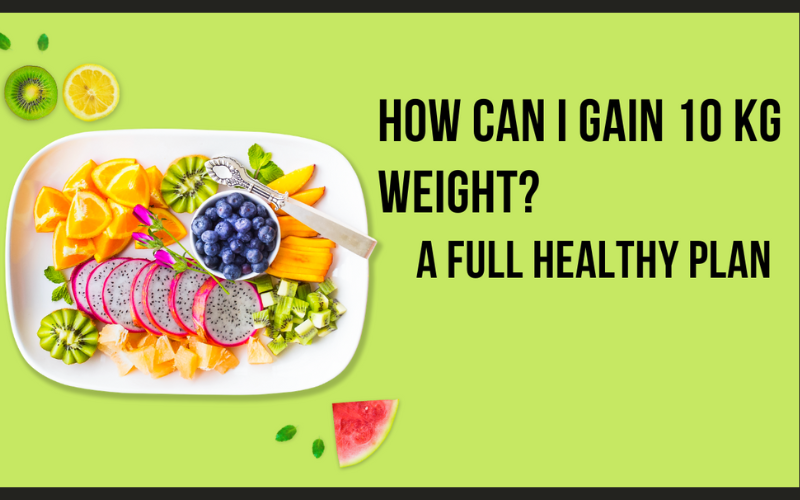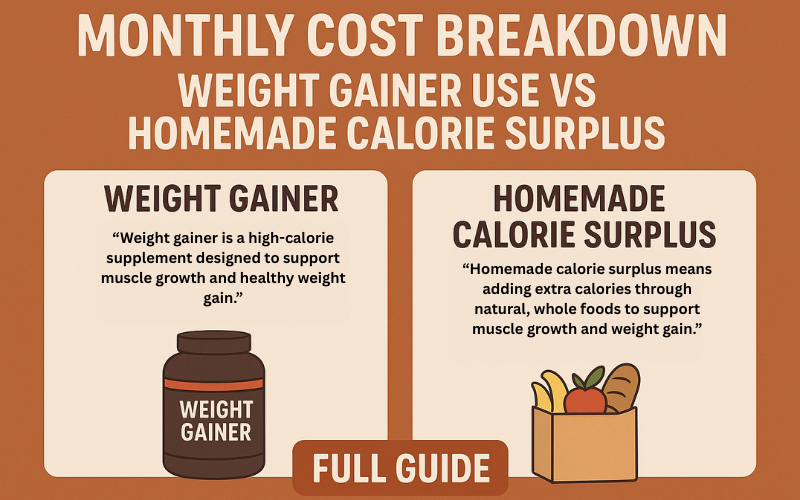Gaining 10 kg of weight might seem like a huge challenge especially for people with fast metabolisms or naturally slim body types. But with the right strategy, consistency, and focus on healthy nutrition and training, it’s absolutely achievable. Whether your goal is to bulk up, recover from weight loss, or simply become stronger, this guide will show you how to gain 10 kg safely and effectively.
Table of Contents
Increase Your Caloric Intake Strategically
To gain weight, you must consume more calories than your body burns. This is called a caloric surplus. The average adult needs a surplus of 500–700 calories per day to gain around 0.5–1 kg per week. That means to gain 10 kg, you’ll likely need 10–16 weeks of consistent eating.
Start by calculating your Total Daily Energy Expenditure (TDEE) using online calculators, then add 500–700 calories to that number daily.
Tip: Don’t rely on junk food. Instead, choose whole, nutrient-dense meals that nourish your body and promote muscle growth.
Eat More High-Quality Protein
Protein is essential for building lean muscle mass, not just adding body fat. If your weight gain goal includes looking fit and toned, then protein must be at the center of your diet.
Ideal protein intake:
1.6 – 2.2 grams of protein per kg of your body weight.
Best protein sources:
- Chicken, beef, fish
- Eggs
- Greek yogurt
- Paneer/tofu
- Lentils & beans
- Whey protein supplements (like Prostar 100 Whey or IsoWhey)
Pro tip: Add a scoop of whey protein to smoothies, oatmeal, or milkshakes for an instant protein boost.
Increase Your Carbohydrate Intake
Carbohydrates are your primary energy source. They prevent your body from using protein for energy, allowing more protein to go toward muscle repair and growth.
Choose complex carbs, such as:
- Brown rice
- Oats
- Whole wheat roti or pasta
- Sweet potatoes
- Bananas, mangoes, and dates
Eating carbs with every meal helps maintain a calorie surplus and supports your workouts.
Eat More Energy‑Dense Foods (Not Junk Food)
Energy-dense foods give you more calories in smaller portions, which is ideal if you struggle with appetite or feel full quickly.
Here are smart, energy-dense food choices:
- Peanut butter, almond butter
- Mixed nuts and seeds
- Whole eggs
- Dried fruits like dates, raisins, apricots
- Full-fat milk, yogurt, and cheese
- Avocados
- Olive oil and desi ghee
Avoid empty calories like chips, soda, and sugary treats—they may increase weight but not in a healthy way.
Other Quick Tips to Speed Up Healthy Weight Gain
Here are some effective, lesser-known strategies:
- Eat 5–6 meals per day instead of 3 large meals.
- Drink your calories – milk, smoothies, mass gainer shakes.
- Don’t drink water right before meals – it reduces your appetite.
- Add healthy fats to meals (e.g., ghee in daal, olive oil on veggies).
- Snack every 2–3 hours with nuts, protein bars, or trail mix.
Combine Nutrition with Strength Training
To make sure your 10 kg weight gain results in more muscle than fat, include resistance training in your routine.
Recommended exercises:
- Squats, deadlifts, bench press, shoulder press
- Pull-ups, rows, lunges, dips
- Focus on progressive overload—gradually increase weights
Training frequency: 3–5 sessions/week
Rest and recovery: Ensure 7–9 hours of sleep nightly.
Note: Avoid excessive cardio—it can burn the calories you need for muscle gain.
A Realistic Timeline: How Long to Gain 10 kg?
Weight gain should be gradual and healthy. Rapid weight gain can lead to fat accumulation, digestive issues, or hormonal imbalance.
Realistic goal:
Gain 0.5–1 kg per week
Total time to gain 10 kg: 10 to 16 weeks
Stay consistent, track your weight weekly, and adjust your calories as needed.
How Can I Gain 10 kg Weight Without Eating Too Much?
If you’re someone who gets full quickly, here are some smart workarounds:
- Drink smoothies with bananas, milk, oats, whey protein, and nut butter.
- Choose soft, calorie-dense foods (khichdi, paratha with egg and cheese).
- Eat small but frequent meals—every 2–3 hours.
- Avoid raw veggies or soup before meals—they reduce hunger.
- Eat your calorie-dense foods first before the rest of your meal.
Frequently Asked Questions (FAQs)
Q1: Is it safe to gain 10 kg in a month?
Gaining 10 kg in just one month is not recommended. It may result in excess fat, bloating, or liver stress. A slow and steady approach is better for your metabolism and long-term health.
Q2: How much protein do I need to gain 10 kg?
You need about 1.6 to 2.2g of protein per kg of your body weight daily. For someone aiming to gain 10 kg, consistent protein intake is key to supporting muscle growth.
Q3: Should I take weight gainer supplements?
Weight gainer supplements can help if you’re struggling to meet your calorie needs. However, they should not replace whole meals. Choose products with balanced macros, minimal sugar, and added digestive enzymes.
Final Thoughts: The Bottom Line
Gaining 10 kg may seem overwhelming at first, but it’s completely achievable with the right plan. Focus on a calorie surplus, adequate protein, complex carbs, and strength training. Use energy-dense foods to boost your intake, and be patient results will come with consistency.
Looking for the best whey protein or gainer to support your weight journey?
👉 Shop now at Nutritionalworld.com.pk for premium imported supplements!


























